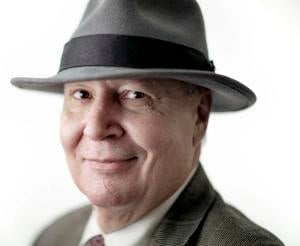The late Glen Smith, long a figure in Santa Fe's world of art, sounded like quite a guy. His bizarre death at the hands of city driver in a city vehicle deserves a more thorough police investigation than it's received. I've read and reread the Santa Fe Police Department's recent reports about transit employee Robert Armijo driving over and killing Smith as he sat on a bench, waiting for a city bus.
Important details are lacking and a key conclusion by police only raises more questions, even though the department supposedly spent almost six weeks investigating after Smith's death on the afternoon of March 25. Officer Julian Martinez concluded Armijo, 74, drove carelessly but could not be cited even for that offense, a petty misdemeanor. Martinez said Armijo plowed into 75-year-old Smith on private property at Santa Fe Place mall.

Under those circumstances, the officer wrote, a more serious violation would have to be substantiated before police could charge the driver. "I cannot prove that Mr. Armijo's actions were reckless, and I have no evidence to suggest that he was under the influence of alcohol or drugs at the time of the incident.
Since the crash occurred on private property, Mr. Armijo will not receive a traffic citation," Martinez wrote. None of the police reports mentioned who installs and maintains the benches at the bus stop where Smith sat and where other riders wait for public transportation.
A related question is whether the lane buses travel to pick up passengers is a public right of way rather than a private roadway. Deputy Police Chief Ben Valdez said the bus stop near the mall is private. That sounds incongruous, considering city buses and their riders are the users.
Valdez could not answer my questions about who installs and maintains the bus benches or the corridor city buses travel to reach riders. He referred me to a spokeswoman at City Hall, and I await answers. Other fundamental questions were not addressed in police reports.
For starters, no mention was made of how far Armijo traveled in the Honda Civic before striking Smith. Also missing was any gauge of the speed Armijo drove as the Honda hopped a curb and slammed into Smith. What's clear is the Honda had enough velocity to pin Smith under the vehicle.
Officer Martinez in his report wrote about a witness saying Armijo seemed to have a difficult time braking, as the car was still "revved up" after striking Smith. I empathize with Armijo, an older fellow who will be haunted by losing control of the vehicle and costing another man his life. Police only made Armijo's life harder by releasing a report with holes.
My first reaction was police employed a double standard, treating a fellow municipal employee more favorably than they would someone else in the same situation. For instance, if Alec Baldwin had been the driver, would the famous actor have been absolved by police? Or would Baldwin's celebrity have led to charges against him, as it did when he was accused of homicide in a shooting death on the set of a movie in Santa Fe County? Baldwin went free in the homicide case after a special prosecutor withheld evidence from defense attorneys. Martinez in his report states Armijo twice stepped on the gas pedal of the Honda before running over Smith.
For someone other than a city employee, that sort of erratic driving would have instigated a rigorous investigation. If I'd been the driver, I suspect police would have ordered me to perform a series of roadside sobriety tests. Someone with the dexterity of LeBron James could not pass those tests, even if stone-cold sober.
No matter how clean my breath-alcohol test, I would have wobbled enough on a heel-toe walk to end up in a jail cell for a night. Police announcing they cannot cite Armijo for any traffic violation won't save the city money or stave off all the other questions. A hefty payment will be necessary to keep any civil lawsuit brought by Smith's estate from reaching a jury.
City police fouled up when they initially announced there was no driver error in Smith's death. That false claim might have been forgotten if a solid investigation had followed. Instead, police have compounded the problem with their insubstantial report.
Their incomplete investigation only keeps the story of what went wrong alive for more days and additional news cycles. That's bad for Armijo, who must live with emotional pain, and it hurts people who knew Smith and miss him. Ringside Seat is an opinion column about people, politics and news.
Contact Milan Simonich at [email protected] or 505-986-3080..
Politics

Holes mar investigation of man's death at bus stop

Fundamental details are missing, such as the speed of the car that killed Glen Smith and what entity maintains the bus lane.















